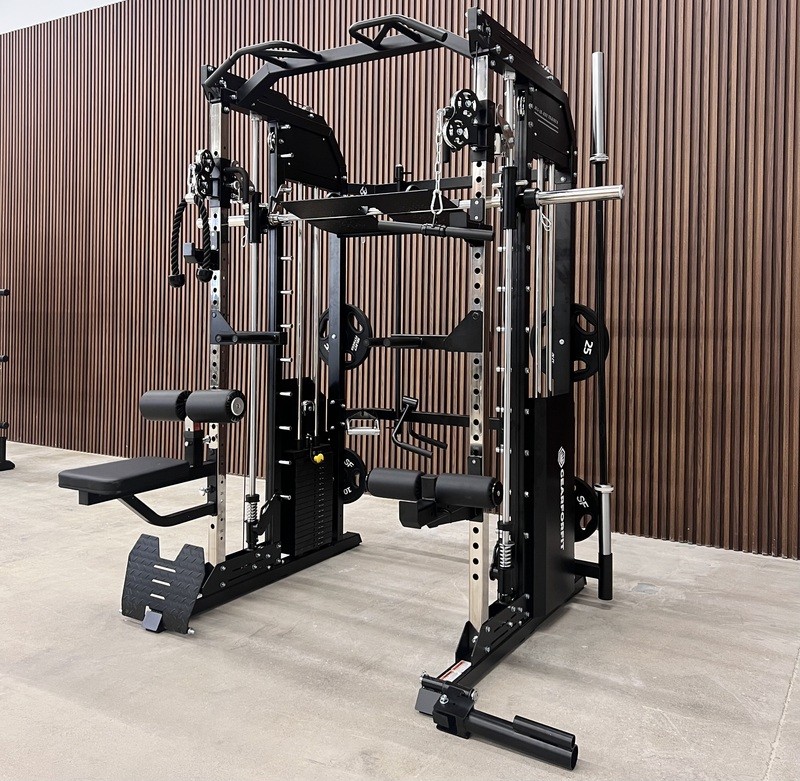blog
The Impact of Training on Mental Health: How Fitness Helps Fight Stress and Improve Mood
July 15, 2023Life has become fast-paced and unpredictable for many of us, with stress and anxiety becoming constant companions. But what if we told you there's a way to combat stress and improve your mental health? We're talking about training and fitness! Regular exercise not only reduces stress levels but also improves mood and productivity. In this article, we will discuss the most effective types of training for mental health, and how to incorporate exercise into your life properly.

How fitness influence mental health
Modern individuals often encounter mental health issues such as stress, anxiety, depression, or low self-esteem. However, there is a way to address these problems - through physical activity and sports. Research shows that regular exercise can effectively reduce stress and anxiety, improve mood and productivity, and enhance self-esteem.
Fitness and stress
Stress is a familiar sensation that many of us experience. It can stem from work, family problems, or financial concerns, and it impacts our well-being. Stress is the body's natural response to environmental changes, and it can have both positive and negative effects on our health."
Positive stress, also known as 'eustress,' arises in response to challenges or new tasks and can be motivating. For instance, when an individual experiences eustress while preparing for a competition, it can provide additional motivation to enhance their performance.
On the other hand, negative stress, also known as 'distress,' can stem from intense emotional experiences, work overload, personal problems, and other factors. Distress can have adverse effects on health, leading to feelings of restlessness, anxiety, irritability, and depression.
Fitness training can serve as an excellent method for combating stress and improving mood. Exercise aids in reducing distress and enhancing our stress response. But how does it work? When we engage in physical activity, our body releases endorphins, which are known as the 'happy hormones' that elevate our mood and decrease stress levels. Furthermore, exercise assists our body in lowering cortisol levels, a stress hormone that can have detrimental effects on our health when it remains high. Exercise also promotes better sleep and reduces fatigue, both of which contribute to effective stress management.
Sports and productivity
Exercising in the gym not only helps build a strong and healthy body but can also significantly enhance your productivity at work and in your daily life.
If you feel like you're losing focus or energy throughout the day, exercising can help you regain strength and vitality.
Physical activity stimulates the brain, improves blood circulation, and enhances metabolism in the body. This, in turn, increases cognitive function and the ability to work. People involved in sports have a higher level of concentration and quick reactions.
Sports and mood
When we exercise, our bodies release endorphins, which are hormones of happiness that improve our mood and reduce stress levels. Sports can be an excellent means of enhancing social skills and forging new connections. Group workouts can serve as ideal environments to meet like-minded individuals who share your interests.
What types of exercise are most effective for mental health?
Sports training holds significant importance for mental health. But which types of training are most effective in this regard? Let's explore a few that can be particularly helpful.
Cardio exercises
Cardio exercises can aid in managing stress and depression. They can also regulate mood and reduce anxiety. One of the mechanisms responsible for these effects is associated with the release of endorphins, which are natural painkillers and mood elevators produced during physical activity. Cardio exercises also optimize oxygen intake by the lungs and increase blood flow, thereby improving brain function and facilitating faster task completion.
Yoga and meditation
Yoga is not only a physical practice but also a spiritual discipline that can alleviate tension, cultivate mental tranquility, and enhance mood. It has the potential to reduce stress and anxiety levels, improve concentration, and mitigate the risk of depression.
Strength training
Strength training, including exercises like pull-ups, bench presses, and squats, can uplift your mood and help release negative emotions. It can also enhance self-confidence and boost self-esteem. This is attributed to the improvement in strength levels and the way your body looks, which can contribute to increased self-assurance.
How to incorporate exercise into your life
Integrating workouts into your life can be a challenge, especially if you already have a busy schedule with work, family, and other commitments. However, with the right approach, exercise can become an integral part of your routine and can even enhance your quality of life. Here are some tips for incorporating exercise into your life:
- Make time: Begin by carving out time in your schedule for workouts. This may require waking up earlier or staying up later to accommodate exercise. Alternatively, consider taking classes during your lunch break or after work.
- Find motivation: Seek out sources of motivation to exercise. You can find an exercise companion who will support you, or set a goal, such as participating in a race.
- Use apps: There are numerous apps available that can assist you in incorporating exercise into your life. These apps can help you track your progress and send reminders when it's time to work out.
- Do not forget about home workouts: If you don't have time to go to the gym, you can exercise at home. There are numerous exercises that you can perform in the comfort of your own home with or without gym equipment.
- Take care of yourself: Don't be too hard on yourself with your workouts. If you can't exercise every day, don't give up immediately. Gradually incorporate training into your life and remember to prioritize rest.
In conclusion, it is evident that exercise can have a substantial impact on maintaining mental health, alleviating stress, improving mood, and enhancing overall well-being. Regardless of the type of workout you choose, they all contribute to achieving a better physical and mental state. It is crucial to remember that consistency in training and maintaining proper nutrition also play vital roles in attaining desired results. Therefore, don't postpone engaging in sports, incorporate fitness into your lifestyle now, and experience the myriad positive effects it can have on your health and mood!





